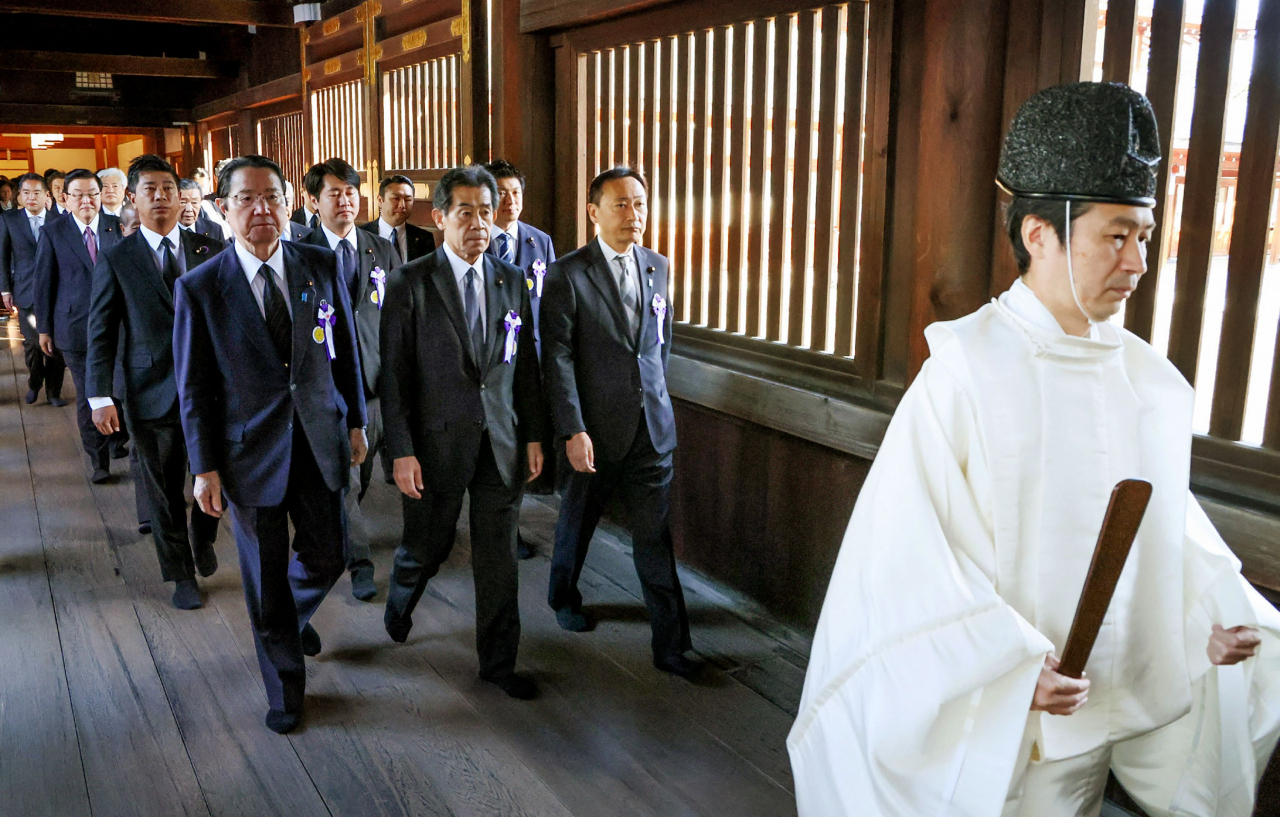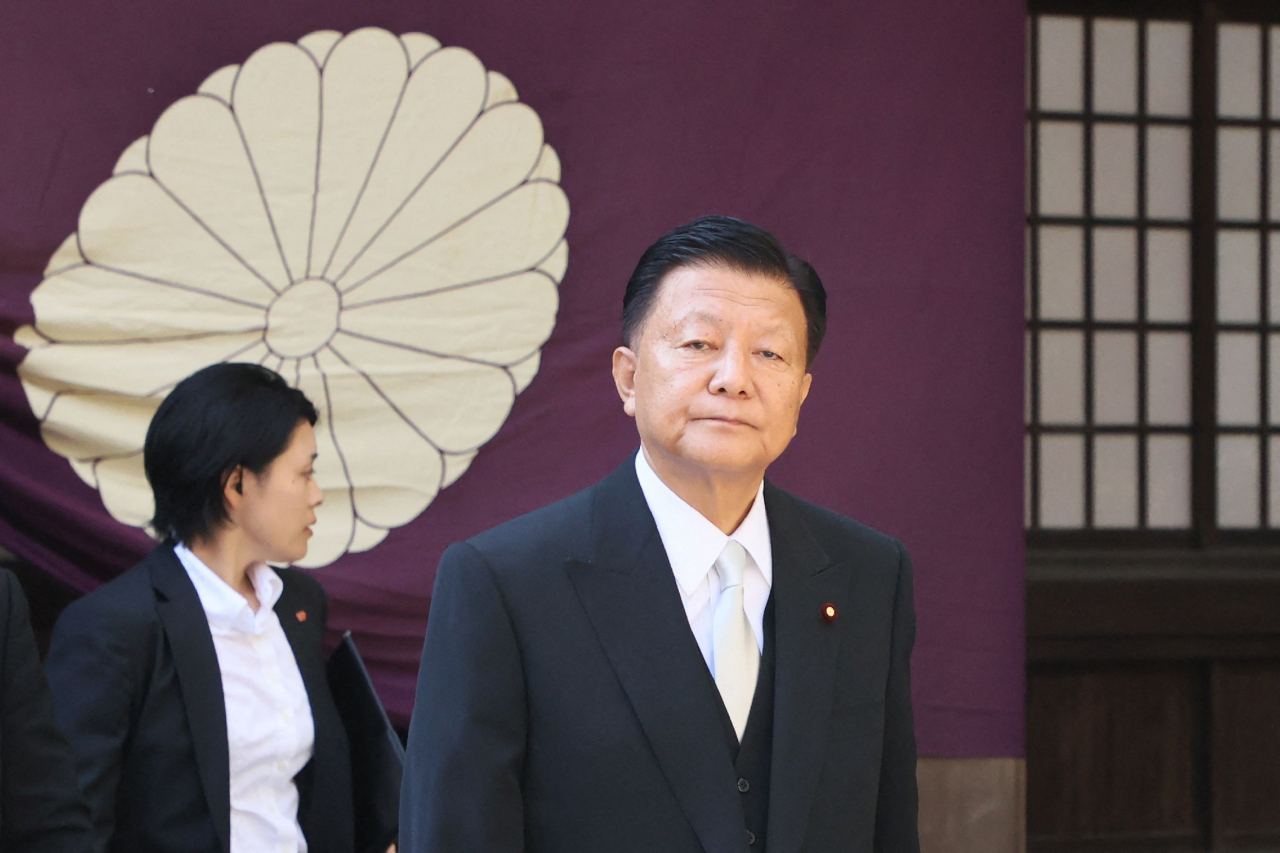 |
Japanese lawmakers visit the Yasukuni Shrine on the annual autumn festival in Tokyo on Wednesday. (AFP-Yonhap) |
South Korea's Foreign Ministry on Wednesday expressed regret over Japanese leaders' visit to the Yasukuni shrine, which Seoul sees as a symbol of Japan's military aggression during its 1910-45 colonial rule on the Korean Peninsula.
The government urged Japanese leaders to "squarely face history" to break with militarism, which would mark a crucial step to pursuing the advancement of Seoul-Tokyo ties in the face of growing geopolitical uncertainties surrounding North Korea.
"The government of (South Korea) expresses deep disappointment and regret over the fact that responsible leaders of Japan have once again sent offerings to and paid respects at the Yasukuni shrine which glorifies Japan’s war of aggression and enshrines war criminals," Lim Soo-suk, a Foreign Ministry spokesperson, said in a statement Wednesday.
"The (South Korean) government strongly urges the leaders of Japan to squarely face history, and demonstrate through action their humble reflection and sincere remorse for Japan’s past history and thus to contribute to the future-oriented development of Korea-Japan relations."
The statement came immediately after about 90 lawmakers of a bipartisan group on Wednesday visited the Yasukuni shrine in Tokyo on the second day of the three-day fall rite, at around 8 a.m. The group has been paying regular visits during the shrine's annual spring and fall festivals, which resumed from December 2021 after the pandemic. Their last visit was two months before, on Aug. 15, to mark the anniversary of its surrender in World War II.
Also visiting the shrine were special adviser to the prime minister, Ozato Yasuhiro, Cabinet Office Deputy Minister Ibayashi Tatsunori, and State Minister of Economy, Trade and Industry Iwata Kazuchika.
Ichiro Aisawa, vice chairman of the bipartisan group, was quoted as saying by Japanese news outlets at a press conference Wednesday that Japan "must not forget that behind the prosperity of Japan today are the many spirits of the dead," adding the visit is meant to "convey to the next generation the misery of war and the preciousness of peace."
 |
Japan's Economic Revitalization Economy Minister Yoshitaka Shindo (right) leaves after paying a visit to the Yasukuni shrine during the annual autumn festival in Tokyo on Tuesday. (AFP-Yonhap) |
On Tuesday, the first day of the shrine's autumn festival, Japanese Prime Minister Fumio Kishida sent an offering at Yasukuni in Tokyo but did not make an in-person visit. Kishida has yet to visit the shrine since taking office in October 2021.
Making the trip instead were Yoshitaka Shindo, minister in charge of economic revitalization; Yasutoshi Nishimura, minister of economy, trade and industry; and Sanae Takaichi, economic security minister.
The Yasukuni honors over 1,000 convicted Japanese war dead from 1868 to 1954, including 14 who were Class-A criminals with grave responsibilities for the war crimes.
It has sparked criticisms from Japan's neighbors, including Korea and China.
On Tuesday, China's Foreign Ministry spokesperson Mao Ning said Japan should honor the "pledge of facing up to and reflecting on the history of aggression, make a clean break with militarism and earn the trust of its Asian neighbors and the international community."
Lim, from Korea's Foreign Ministry, on Tuesday said in a briefing he was closely monitoring the situation regarding Kishida's offerings to the shrine.





![[Exclusive] Hyundai Mobis eyes closer ties with BYD](http://res.heraldm.com/phpwas/restmb_idxmake.php?idx=644&simg=/content/image/2024/11/25/20241125050044_0.jpg)
![[Herald Interview] 'Trump will use tariffs as first line of defense for American manufacturing'](http://res.heraldm.com/phpwas/restmb_idxmake.php?idx=644&simg=/content/image/2024/11/26/20241126050017_0.jpg)
![[Herald Review] 'Gangnam B-Side' combines social realism with masterful suspense, performance](http://res.heraldm.com/phpwas/restmb_idxmake.php?idx=644&simg=/content/image/2024/11/25/20241125050072_0.jpg)